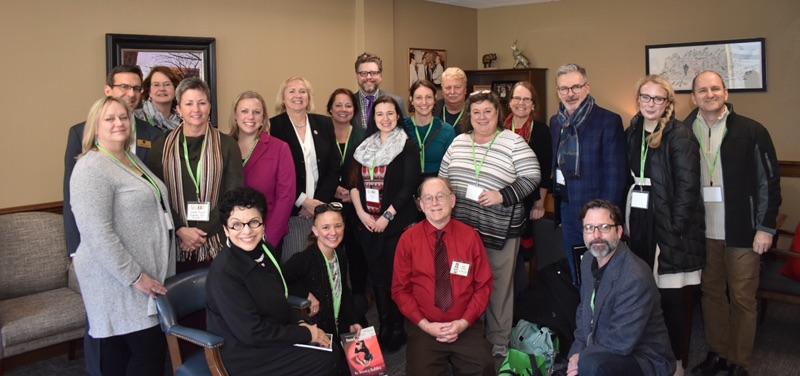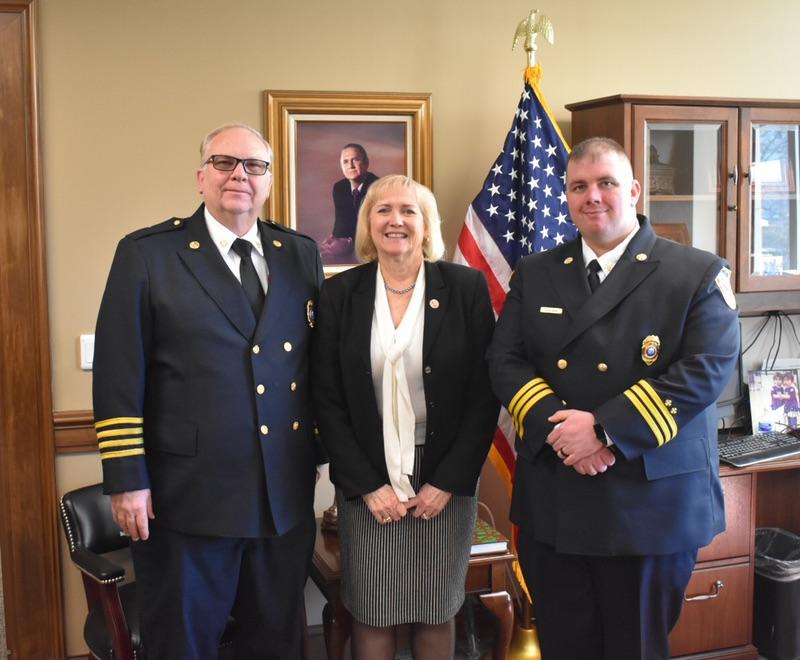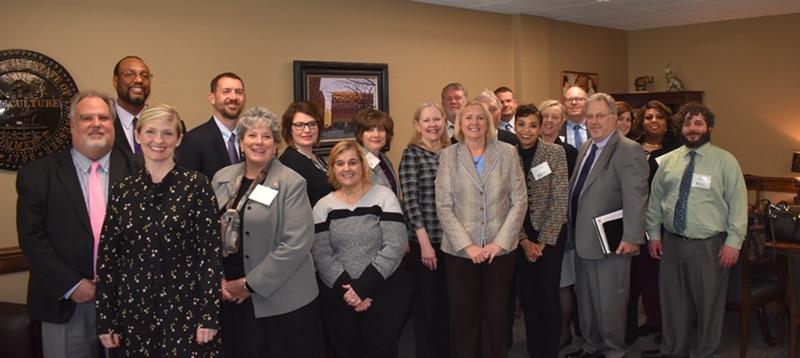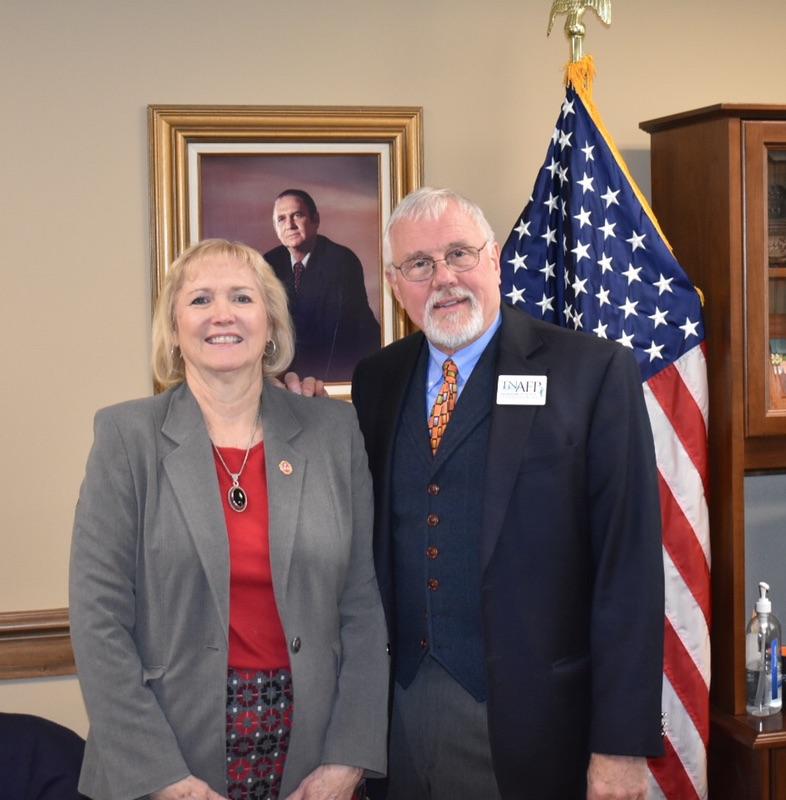
Senate takes action on key education bills
State senators approved several key education bills last week, including three proposals to increase school safety, a bill improving the state’s public charter school authorization process and a measure enhancing agricultural education. Senate committees also conducted hearings on the proposed budgets of 14 departments and agencies of state government, as lawmakers continue a thorough review of Governor Bill Lee’s spending plan for the 2019-2020 fiscal year.
School Safety / Grant Program Prioritizes SROs – Among legislation advancing this week to enhance school safety is Senate Bill 803. The measure, which is part of Governor Bill Lee’s legislative package, makes changes to the existing school safety grant program, prioritizing grants for School Resource Officers (SROs).
Lee’s budget proposal doubles recurring funds in the program from $10 million to $20 million. In addition, a $20 million investment is proposed in non-recurring funds, for a total of $40 million recommended for the 2019-2020 fiscal year. The legislation also accommodates underserved counties working to secure schools and fill SRO positions by adjusting the match requirements to be proportional with districts’ fiscal capacity. Approximately 500 schools in Tennessee do not have SROs.
The proposal allows schools that currently have an SRO to use the grants to fund other school safety priorities, including implementation of building security measures or developing youth violence prevention programs. Upon application for a grant, the Local Education Agencies (LEA) must describe how the funds will be used and how it aligns with the needs identified in their school safety assessment.
In 2018, all 147 school districts submitted assessments for every school in the state as a result of legislation passed by the Tennessee General Assembly addressing vulnerabilities and risks. The legislature appropriated $25 million in one-time funding last year to assist in that effort. This is in addition to the appropriation of $10 million in recurring grants to make both major and minor school safety improvements, ranging from better door locks and updated visitor screening procedures, to adding mental health staff positions.
The legislation proposed this year greatly enhances those efforts. It helps our rural schools which have struggled to come up with funds to hire SROs. It also provides more funds to ensure we continue to make needed improvements to ensure the safety of every Tennessee student. The bill next moves to the Finance, Ways, and Means Committee and then to the Senate floor for a final vote.
School Safety / Threat Assessment Teams — Similarly, in an effort to help school districts develop effective and comprehensive school safety plans, the Senate Education Committee approved legislation to allow school districts to develop threat assessment teams. The teams will develop comprehensive intervention-based approaches to prevent violence, manage reports of potential threats, and create a system that fosters a safe and effective school environment.
Senate Bill 1238 outlines the duties of the threat assessment team which will be to:
· access training on threatening or disruptive behavior from law enforcement and mental health service providers;
· develop interventions for individuals exhibiting threatening or disruptive behavior, conducting threat assessments;
· provide guidance to students, faculty, and staff regarding these issues;
· establish procedures on how to report this type of behavior;
· provide guidance and best practices on the intervention and prevention of violence; and
· provide post-incident assessments and evaluations, among other duties.
This legislation enhances current law requiring LEAs to develop a school safety plan. The threat assessment teams are intended to help LEAs implement their school safety plans.
Enhanced Security / Schools, Parks, and Places of Worship — The full Senate passed legislation to promote enhanced security and police presence at Tennessee’s most vulnerable locations, including schools. Senate Bill 1337 authorizes state or local chief law enforcement officers to develop and implement policies and guidelines allowing off duty law enforcement officers using their marked vehicles to travel between vulnerable areas such as schools, churches, and parks. Prior to developing and implementing such policies and guidelines, the chief law enforcement officer must receive approval from the agency’s local governing body.
Tennessee Public Charter School Commission — Legislation creating an independent state commission to approve high-quality public charter schools in Tennessee was unanimously approved by the Senate Education Committee last Wednesday. Senate Bill 796 gives the new Tennessee Public Charter School Commission the authority to review appeals, a task currently held by the State Board of Education. It also establishes criteria to enhance school facilities.
The bill is part of Governor Bill Lee’s education initiatives designed to improve education opportunities for Tennessee students. Lee worked with local school districts to incorporate changes to the legislation. The legislation also calls for transparency by requiring that commission meetings are made available for public viewing over the internet by streaming and archived video recordings.
The measure now goes to the Senate Government Operations Committee for approval.
Agriculture Education and Youth Participation Task Force – The Senate Education Committee approved legislation this week seeking to enhance agricultural education in Tennessee. Senate Bill 801 establishes the Agriculture Education and Youth Participation Task Force with the goal of preparing students for higher education and success in the Tennessee’s agricultural sector.
The nine-member task force will analyze and make recommendations related to agricultural education in Tennessee, emerging fields in the industry, and the impact of new technologies on agribusiness. They will also look at how Science, Technology, Engineering, and Math (STEM) education can be aligned with the state’s agricultural education programs. In addition, the group will consider ways to integrate agricultural education and career readiness goals into the Tennessee Pathways Initiative. The Pathways Initiative allows schools to increase the variety and quality of the options and opportunities available for high school students, so they can transfer seamlessly into college or the workforce.
According to the Tennessee Department of Economic and Community Development, Tennessee’s strong agricultural economy accounts for nine percent of the state’s economy, while generating $52.6 billion in output.
Aptitude Assessment — Finally, the full Senate approved legislation requiring that seventh and eighth grade students take a college and career readiness aptitude assessment. Current law states that all public middle schoolers or ninth graders are administered an interest or career inventory to assist students in determining their interests as they consider future career decisions. Senate Bill 809 would add an aptitude assessment for seventh and eighth graders to help students realize skills and attributes that might direct them towards a career and coursework that capitalizes on their strengths.

Arts Advocacy Day on the Hill always
brings out a big turnout
State Senators continue efforts to support veterans and their families through legislative initiatives
Tennessee has received high marks from veterans’ groups for legislation enacted to support service members and their families over the last several years. This week, the Senate passed legislation continuing these efforts. This includes Senate Bill 1197 which aims to make the relocation process smoother for military families. The legislation allows a dependent child of a service member who is relocated to Tennessee on a military order to enroll in the school district the child will reside in prior to moving into the district.
In order to register, the parents must prove that the student is a dependent on a service member who is being relocated on military orders. The parents must also verify that upon relocation the student will become a resident within the designated school district. The bill allows for the board of education to adopt policies establishing a reasonable time period for such families to provide proof of residency within the school district.
In-State-Tuition / Spouse or Dependent of Active Duty Military — Similarly, Senate Bill 242 ensures that the spouse or dependent of an active duty military member can receive in-state-tuition at a Tennessee public university, even after being transferred out of the state on military orders. In this circumstance, the spouse or dependent would be classified as an in-state student if he or she was accepted for admission as a Tennessee resident and maintains continuous enrollment.
Professional Out-of-State Licensure / U.S. Armed Forces Members and Spouse — To continue efforts to help out-of-state military families transition smoothly into Tennessee, the Senate Commerce and Labor Committee approved legislation allowing a member of the U.S. Armed Forces or his/her spouse to practice their occupation for up to one year with an out-of-state medical license when stationed in Tennessee.
Under Senate Bill 384, these armed forces members and their spouses are eligible to practice occupations regulated by the Department of Commerce and Insurance or the Department of Health, as long the license from their home state is current and they are in good standing with the state of their currently held license.
The bill will now move to the floor to be approved by the full Senate.
Post-Traumatic Stress Injury Awareness Day — Finally, the Senate approved legislation to designate June 27th of each year as Post-Traumatic Stress Injury Awareness Day. Veterans who endure severe combat stress can develop an invisible wound that leads to physical changes in the brain. In the past, this condition has been referred to as Post-Traumatic Stress Disorder (PTSD), but it is more accurately and honorably described as an injury rather than disorder. The legislation is designed to promote awareness of persons suffering from post-traumatic stress injury.
Other efforts by the General Assembly in recent years to support veterans and their families include legislation ensuring full property tax relief for 100 percent service-related disabilities, allowing service members’ military training to count towards a degree, giving hiring preference to veterans, offering tuition free college education to the children and spouse of Tennessee soldiers who have died in combat, and making it easier for those who are deployed overseas to vote. These are in addition to legislative efforts to provide enhanced educational benefits to active and retired veterans.

I was pleased to visit with members of the Knoxville area architects
In Brief
Opioid Prescribing Practices — The full Senate approved legislation last week amending limits placed on opioid prescriptions under the TN Together legislation approved by the General Assembly last year. The purpose of the bill is to remove unintended barriers that could prevent patients receiving post-operative and palliative care medications from receiving legitimate, effective pain management treatment, while still keeping opioids out of the hands of abusers.
Senate Bill 810 allows providers and patients to voluntarily request a partial fill, while encouraging providers to write prescriptions for the lowest effective amount. In addition, the proposal amends the current twenty-day prescription of opioids for major surgeries to a thirty-day prescription. This action would make the length of opioid prescriptions for three, ten or thirty days. For example, major surgeries such as knee and hip replacements, orthopedic neurological spine surgeries, etc. would fall under thirty-day prescriptions. Ten-day prescriptions would be used for such surgeries as appendectomies, C-sections, ACL/MCL repairs. Three-day prescriptions would be used for procedures such as tooth extractions or kidney stones.
This bill will do is ensure that patients who have undergone major surgeries are receiving the pain medication they need to get out of bed, go through physical therapy and heal. The bill now awaits approval from the House of Representatives.
EMTs / Compensation to Survivors — Legislation extending compensation to emergency medical technicians (EMTs) and paramedics who are killed in the line of duty unanimously passed the full Senate floor last week. Under current law, the surviving spouse or child of a firefighter, volunteer rescue squad worker, or law enforcement officer who died in the line of duty receives a $250,000 annuity in $50,000 per year increments for 5 years and health insurance for two years. Senate Bill 29 adds EMTs and paramedics to this list requiring the state to reimburse local governments who provide the health insurance and annuity to their surviving families.
Rapid Response / Emergency Teams — The full Senate approved the “Facilitating Business Rapid Response to State Declared Disaster Act” which seeks to eliminate red tape from hindering disaster response teams which are needed to immediately restore infrastructure in a time of crisis. Senate Bill 624, sponsored exempts disaster response teams who enter the state temporarily to repair critical infrastructures, including water, gas, power, and communications, from taxes that occur as a result of establishing residency in the state. The legislation aligns Tennessee law with similar statutes in 29 other states.
The Rapid Response Act also establishes that an employee or business is permitted to perform disaster-related work without Tennessee licensure, as long as they hold a relevant certificate in another state. The exemptions only apply if a natural disaster occurs or if the governor or president declares a state of emergency in Tennessee. The response teams are only permitted to remain in Tennessee for 120 days unless the president or governor extends the disaster declaration. This bill enables critical infrastructure teams to act efficiently and effectively when Tennesseans need them most.
STEP UP Scholarship – The full Senate approved legislation on Thursday improving Tennessee’s STEP UP scholarship. The scholarship assists students with intellectual and developmental disabilities (IDD) in paying for post-secondary education. Senate Bill 516, which I am the sponsor, prohibits an eligible post-secondary institution from approving or denying a student residential housing based solely on being a part of the STEP UP scholarship program. This helps ensure these students will be afforded an opportunity to live on campus and fully immerse themselves in the college experience.
The STEP UP Scholarship has served young adults since its inception with a high success rate at six universities which have the comprehensive transition and post-secondary program designation from the U.S. Department of Education. These are Vanderbilt University, University of Tennessee at Knoxville, University of Memphis, Lee University, Lipscomb University and Union University in which about 120 students are currently enrolled. Three of these universities have a residential component.
The legislation specifies that a school is not required to provide additional accommodations to a participating student beyond the basic Americans with Disabilities Act requirements afforded to all disabled students. Eligible colleges are also allowed to establish their own individual criteria in regards to the residential application process. The bill now awaits approval in the House of Representatives.
Streamlining Death Penalty Process – The full Senate voted to reform the state’s death penalty appeals process by expediting cases straight to the Tennessee Supreme Court, eliminating an intermediate step to the Court of Criminal Appeals. Senate Bill 400 follows the Tennessee Crime Victims’ Bill of Rights Amendment adopted by voters in 1998 which gives crime victims the right to a speedy trial and a prompt and final conclusion of the case after conviction or sentence.
Tennessee is in the minority of states which do not have a direct appeals process in capital crime cases as a result of a 1967 law which put midlevel appeals in place. That law implemented a process in which persons sentenced to death have automatic appeals to the Tennessee Court of Criminal Appeals before moving to the State Supreme Court for a mandatory review. The decision by the intermediary court is not final until the state’s highest court hears the case. Death row inmates can also file appeals in federal court, meaning it can take decades before the appeals process is complete. The legislation now heads to Governor Bill Lee for his signature.
Jails / Non-violent Misdemeanor Crimes — The full Senate approved legislation this past week authorizing police officers to give citations, in lieu of an arrest, for non-violent misdemeanor crimes. Nearly half of Tennessee’s jail population consists of misdemeanor offenders, and of the 15,000 pretrial inmates, over 5,000 are awaiting trials for misdemeanor charges.
Senate Bill 587 intends to improve overcrowding in Tennessee jails by allowing police officers to issue citations to nonviolent misdemeanor offenders, rather than arrest them. The police officer, however, would still have the authority to arrest offenders if there is reasonable expectation that they are a flight risk or will continue to commit the crime.
In addition to relieving overcrowded jails, the legislation also seeks to eliminate a vicious cycle of someone getting arrested for a minor non-violent crime, losing their job and source of income due to being arrested and detained, and then returning to court for unpaid fines or costs.
FGM / Child Abuse – The Senate voted last week to approve legislation expanding the offense of female genital mutilation (FGM) by creating a civil cause of action for victims. FGM is practiced on young girls and women in the Middle East, Africa and Asia, as well as locations in the United States. The World Health Organization (WHO) estimates that more than 200 million girls and women worldwide have undergone FGM in countries where the practice is concentrated, with the majority being cut before age 15. Senate Bill 1166 also expands offenses related to child abuse to include FGM. The practice, which has serious health risks, is widely acknowledged as a human rights violation against women. The legislation is currently pending action in the Criminal Justice Subcommittee in the House of Representatives.
Job Creation – Over 2,500 jobs are headed to Tennessee! The Department of Economic and Community Development made two major job announcements this week. SmileDirectClub, the market leader and pioneer of doctor-directed, remote invisible aligner therapy, will create 2,010 new jobs in Nashville and Antioch over the next five years. The company will invest $217 million to expand its headquarters and facilities.
In addition, Arrive Logistics announced plans to expand its Chattanooga location to keep up with the company’s continued steady growth due to the strong logistics industry presence in the Southeastern United States and in Chattanooga. The logistics company will invest approximately $3.6 million into the region and create 500 new jobs in Hamilton County.

Members of the Seymour Volunteer Fire Department stopped by for a visit

Senator Briggs and I enjoyed our visit with members of the Associated General Contractors

Supporters of my bill to provide Proton Therapy to state employees stopped by to discuss the bill

Public Transit providers from across the
state stopped by for a visit.

Dr. Ken Bielak dropped by for a visit while
he was serving as the Doctor of the Day.
For information on State Senators including phone numbers and email addresses, click Tennessee State Senators.
For House members, click Tennessee House Members
For all other information on the General Assembly including legislation, schedules and videos, click Tennessee General Assembly
As always thank you for continued support!
Sincerely,
Becky Massey
District 6 Senator
615-741-1648.
